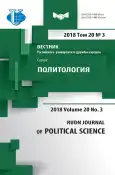SEPARATISM IN THE BASQUE COUNTRY
- Авторлар: Basmanova A.A.1, Mussaui-Ulianishcheva E.V.1
-
Мекемелер:
- Peoples’ Friendship University of Russia (RUDN University)
- Шығарылым: Том 20, № 3 (2018)
- Беттер: 365-375
- Бөлім: POLITICAL PROCESSES IN CONTEMPORARY WORLD
- URL: https://medbiosci.ru/2313-1438/article/view/339990
- DOI: https://doi.org/10.22363/2313-1438-2018-20-3-365-375
- ID: 339990
Дәйексөз келтіру
Толық мәтін
Аннотация
The article analyzes the problem of separatism in the Basque Country of Spain, which has a several hundred years’ history. Basques are one of the largest divided peoples of modern Western Europe, which live in two EU states: Spain and France. The authors critically interpret the historical evolution of the struggle for self-determination of the region, emphasizing the ideological and political components of this process. The problem is considered in the context of the separatist sentiment that has permeated Europe in the recent decades. The authors note that at the present moment the struggle of Basque nationalist organizations has lost the extremist component (the terrorist organization ETA has self-dissolved) and acquired a political character. This change can be related to the democratization of the Spanish state in relation to the problems of the Basques, which manifested itself in granting autonomy to the region after the collapse of the fascist dictatorship of F. Franco. At the same time, the change occurred after the tightening of the policy of the United States towards regional nationalists in European countries-satellites of the US, which was expressed in the targeted persecution of the leaders of nationalist movements. The global economic crisis, which hit Spain especially hard, also contributed to the downfall of radical nationalists in the region and their terroristic methods of fighting for self-determination. The article draws parallels between the problem of separatism in the Basque Country and Catalonia, points out the differences and similarities between the two regions, comparatively analyzes the approaches of the leaders of the two provinces to the problems of national autonomy and sovereignty. It examines the future prospects for the Basques’ independence and identifies the potential bifurcation points of this process in regards to the efforts of the Catalan and Basque peoples, respectively. Also, the effect of the referendum in Catalonia and the resultant aggravation of the political situation will be examined in regards to the prospects of Basque independence. The situation is looked at in the general context of European trends and the geopolitical situation in the world, characterized by the rapid slide of nominally pro-American and pro-Russian global blocs into a new Cold War.
Негізгі сөздер
Авторлар туралы
Anna Basmanova
Peoples’ Friendship University of Russia (RUDN University)
Хат алмасуға жауапты Автор.
Email: basmanova-aa@rudn.ru
Associate Professor of the Department of Foreign Languages of the Faculty of Humanities and Social Sciences, Peoples’ Friendship University of Russia (RUDN University)
Miklukho-Maklaya str., 6, Moscow, Russian Federation, 117198Ekaterina Mussaui-Ulianishcheva
Peoples’ Friendship University of Russia (RUDN University)
Email: 1042010207@rudn.ru
PhD, Associate Professor of the Department of Foreign Languages of the Faculty of Humanities and Social Sciences, Peoples’ Friendship University of Russia (RUDN University)
Miklukho-Maklaya str., 6, Moscow, Russian Federation, 117198Әдебиет тізімі
- Kirsanova N.V. Prichiny transformatsii politicheskoy sistemy Ispanii. Ispaniya i Rossiya: istoricheskiye sud'by i sovremennaya epokha: kollektivnaya monografiya [Reasons for Transformation of the Political System in Spain. Spain and Russia: Historical Fates and Modern Era: Join Monograph]. Moscow: Mezhdunarodnyye otnosheniy; 2017: 284 (In Russ.).
- Prokhorenko I.L. Problema konflikta identichnostey v segodnyashney Ispanii. Ispaniya-Rossiya: Istoricheskiye sud'by i sovremennost' [The Problem of the Conflict of Identities in Modern Spain. Spain-Russia: Historical Fates and Modern Times]. Ed. by O.V. Volosyuk, T.B. Koval', Ye.E. Yurchik. Moscow: Mezhdunarodnyye otnosheniya; 2017: 325—330 (In Russ.).
- Almuñia Fernández C. Las raíces de los movimientos nacionalistas en España. Ispaniya i Rossiya: istoricheskiye sud'by i sovremennaya epokha: kollektivnaya monografiya [Spain-Russia: Historical Fates and Modern Times]. Moscow: Mezhdunarodnyye otnosheniya; 2017: 315 (In Span.).
- Jaroff E. The Basque Conflict: A Change in Nature and in Goals. Undergraduate Research Conference on the EU. 05.04.2008. Available from: http://eucenter.scrippscollege.edu/conf_ papers/Jaroff.doc. Accessed: 15.05.2018.
- Jordi Pedrosa. La prohibición del euskera en el franquismo. Available from: https://radiorecuperandomemoria.com/2017/05/31/la-prohibicion-del-euskera-en-el-franquismo Accessed: 15.05.2018) (In Span.).
- Juan José Ibarretxe Markuartu. “Peace and dialogue in the land of the Basques”. Tip O´Neil Peace Lectures Derry. 02.02.2009. Available from: http://www.lehendakari.euskadi.net/r574075/en/contenidos/noticia/viaje_20090202_ulster/en_viaje/adjuntos/conferencia_ingles.pdf. Accessed: 15.05.2018 (In Span.).
- Ley Orgánica 3/1979, de 18 de diciembre, de Estatuto de Autonomía para el País Vasco. Available from: https://www.boe.es/buscar/pdf/1979/BOE-A-1979-30177-consolidado.pdf. Accessed: 15.05.2018 (In Span.).
- Totoricagüena G. Identity, Culture, and Politics in the Basque Diaspora. Reno: University of Nevada Press; 2004: 20.
- Solo el 16,9% de los vascos quiere la independencia. El Pais. 23.06.2017. Available from: https://politica.elpais.com/politica/2017/06/23/actualidad/1498213521_535228.html. Accessed: 15.05.2018 (In Span.).
Қосымша файлдар









